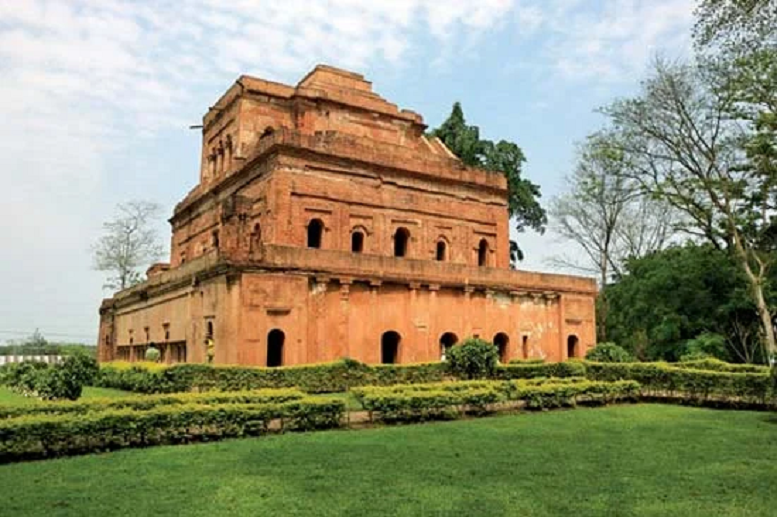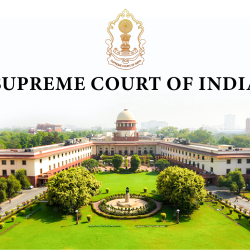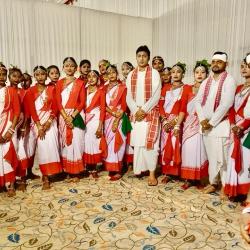It is widely acknowledged that the cornerstone of a nation's identity is rooted in its language and literature. The Assamese language and its rich literary heritage have an illustrious history and legacy of their own. Therefore, it is incumbent upon every Assamese residing beyond the borders of Assam to disseminate, promote, and foster the appreciation of Assamese language and literature among non-Assamese individuals.
In every celebratory gathering of the Assamese Diaspora, organizers should conscientiously set aside dedicated programs such as seminars, lectures, open meetings, and essay competitions to delve into the past, present, and contemporary state of Assamese language and literature.
In this context, it is noteworthy to reminisce about the founding of the Delhi Axomiya Xahitya Xamaj in 1968. This esteemed organization, led by the former Union Minister Bijoy Chandra Bhagawati as President, and joined by the former Chief Minister of Assam, Jogendra Nath Hazarika, and the distinguished senior bureaucrat of the Indian government, Principal Bhabananda Deka, as Vice Presidents, accomplished a historic feat. They successfully orchestrated the first-ever PAN-INDIA LEVEL PUBLIC MEETING dedicated to celebrating the GLORY OF ASSAMESE LANGUAGE & LITERATURE. This momentous event, held in New Delhi on November 24, 1968, witnessed the gracious presence of luminaries such as the then President of India, Dr. Zakir Hussain, Ex-President of India, Fakhruddin Ali Ahmed, then Prime Minister of India, Indira Gandhi, and Ex-Prime Minister Morarji Desai. During this event, President Dr. Zakir Hussain officially unveiled the inaugural authoritative book on ASSAMESE LANGUAGE & LITERATURE, tailored for a wider non-Assamese readership, authored by Principal Bhabananda Deka, a literary figure from the 'Awahon-Ramdhenu Era.' The Assamese Diaspora in the Indian capital city of Delhi played a pivotal role in supporting this historic gathering, nearly six decades ago, which focused on Assamese language and literature.
Another significant milestone in the brief yet impactful Delhi tenure of Principal Bhabananda Deka in 1968-69 was his affirmative and successful initiatives in establishing Assamese Departments in two revered Indian institutions: the 'Union Public Service Commission' (UPSC) and Delhi University. His relentless efforts led to the creation of two professorship positions in Assamese at Delhi University, one of which was offered to Assam's esteemed daughter, Dr. Indira, also known as Mamoni Raisom Goswami. In this role, she emerged as a preeminent Indian author, garnering wide recognition in New Delhi and throughout India as a professor and litterateur. She remained eternally grateful to her mentor, Principal Bhabananda Deka.
Three decades after the groundbreaking pan-Indian gathering in New Delhi, the seasoned Assamese Diaspora residing in Delhi rallied once more in support of another voluntary organization, Assam Foundation-India, established by Principal Bhabananda Deka inside the Assam Legislative Assembly complex in 1998. . This event took place at the Tinmurti Bhawan in New Delhi in the presence of several literary and artistic luminaries. The occasion marked the FIRST PAN-INDIAN LECTURE & SEMINAR ON LACHIT BORPHUKAN, which unfolded on April 24, 1999. During this event, Vice-President of India, Dr. Krishna Kant, and Indian Army Chief, General VP Malik, made official announcements regarding the installation of Lachit Barphukan's statue inside the National Defence Academy campus in Pune and the introduction of the Lachit Barphukan Award Gold Medal, which would be bestowed upon the Best NDA cadet annually. These enduring achievements in commemorating the Assamese war hero on a national level, brought about through the untiring efforts and initiatives of Principal Bhabananda Deka, stand as unique and unmatched. They outshine recent celebrations of the fourth centenary of the same Assamese war hero in the Indian capital city, as the Indian government remained unreceptive to establishing any fresh national landmark in Lachit Barphukan's memory. Consequently, the statue at NDA and the Lachit Barphukan Award Gold Medal, established in 1999, remain the sole national-level tributes commemorating the Assamese military general who victoriously thwarted the formidable Mughal Army, unlike other national heroes such as Rana Pratap and Chatrapati Shivaji, who were repeatedly vanquished by the same Mughals.
With this distinguished tradition of non-political, voluntary literary, and research organizations like the Delhi Axomiya Xahitya Xamaj and Assam Foundation-India tirelessly championing the cause of Assamese language, literature, and heritage since the 1960s, it is only befitting for the Assamese Diaspora residing outside Assam and India to continue organizing a diverse array of seminars and lectures dedicated to Assamese language, literature, and heritage in various countries across the globe. I hereby pledge my commitment to collaborate with and support the Assamese Diaspora scattered across continents in successfully executing these envisioned programs on Assamese language, literature, and heritage, should they deem it worthy to do so, by inviting scholars and researchers from around the world, including Assam.
It is essential to highlight a recent occurrence: an International Seminar and Lecture program on the Brahmaputra was convened at the India International Centre, New Delhi, by the Government of Tibet, as part of the International Tibet River Conference. I was privileged to serve as the keynote speaker, addressing the pressing environmental challenges faced by the Brahmaputra due to dams constructed by China along the Yarlung Tsangpo in Tibet. Prior to my departure to Delhi, I disseminated information about this crucial event, organized by a foreign government in India's capital city, through numerous Delhi-based Assamese journalists, officials, and organizations. The objective was to facilitate the attendance of Delhi's Assamese Diaspora, enabling them to engage with the lifeline of Assam. Regrettably, not a single member of the Assamese Diaspora was able to participate in the program. Consequently, the Assamese Diaspora in and around Delhi missed a significant opportunity to interact and network with eminent scholars focused on the Brahmaputra, as well as with Tibetan individuals who were born and raised in Tibet and have experienced oppression and subjugation under the Chinese government. However, many similar opportunities can be cultivated in Delhi by the Assamese residents, in collaboration with Delhi and Dharamsala-based Tibetan exiles, their government, and the Nobel laureate, His Holiness the Dalai Lama. These opportunities could facilitate discussions and exchanges of ideas regarding shared historical ties, century-long interactions, cultural and religious connections, as well as the common environmental threats faced by both Tibetans and Assamese due to China's relentless dam construction on the Brahmaputra and its eventual plan to divert the river's course towards mainland China.
In this manner, efforts persist at various levels to collaborate with other organizations and even like-minded foreign governments to spotlight various facets of Assam beyond its borders. It is our hope that these endeavors will garner increased support and partnerships in the future.
- 146773 reads









Add new comment